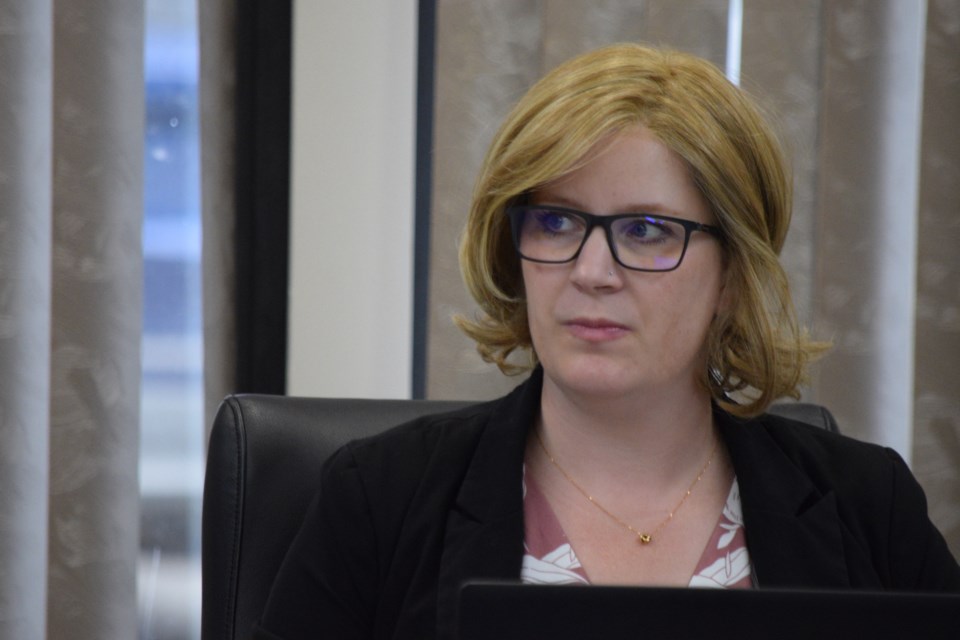BARRHEAD – There could be a time, if gas prices continue their upward rise, when the Pembina Hills School Division (PHSD) will have to charge parents an additional transportation fee, regardless of whether their child receives provincial transportation funding.
It is something PHSD chair Judy Lefebvre said they might have to consider if the provincial government does not find a way to help school divisions, especially those in rural areas, keep up with rising fuel prices.
"I am not suggesting that it is something we should do, but if fuel prices continue to remain high and the province does not compensate school divisions, we might have to reconsider it," Lefebvre said during the May 11 trustee meeting.
She added she has heard cases where school boards have opted to charge students riding the bus an extra $350 to $400, regardless of whether the student receives transportation funding.
This is why trustees authorized administration to draft a letter to Education Minister Adriana LaGrange asking the province to reinstate the Fuel Price Contingency Fund program.
Secretary-treasurer Heather Nanninga said that under the program (introduced in 2007), school divisions received additional transportation funding whenever the price of fuel was above a certain threshold.
The province discontinued the program in 2013. At the time, the threshold was anything over 60 cents a litre. In the draft letter, the school division is asking for the program to take effect when fuel prices are above $1.20 a litre.
"Pembina Hills has been hit fairly hard with (a variety of) pandemic and supply-related issues," she said. "Things like fuel, utility and challenges of getting stuff physically here have been a problem all over our division. "
Nanninga added although the province increased transportation funding for the 2022/2023 year, it wasn't "nearly enough" to match the increases. In the 2022/2023 school year, Pembina Hills’ provincial transportation grant increased by 4.4 per cent.
However, Nanninga said projected fuel costs are expected to increase the overall costs of the department by 6.6 per cent. She also noted several other school boards are actively lobbying Alberta Education to reinstate the contingency funding, as is the Student Transportation Association of Alberta.
Nanninga said that she checked the price of diesel before the meeting, and most Barrhead gas stations were selling diesel at $1.96 per litre.
Pembina Hills East Ward 3 trustee David Truckey interjected that most experts expect fuel prices will rise another 15 cents a litre.
"And that is in just the next 10 to 15 days," he said. "It is farming season, and the long weekend is approaching, which means fuel will magically go up again."
Truckey also suggested it is something trustees should also be lobbying their local MLAs about at the upcoming Alberta School Board Association (ASBA) spring conference in early June.
He also added the board should send copies of the letter to the premier and the Opposition leader Rachel Notley.
"I think it is going to be a big topic (at the conference)," Lefebvre said.
She added that high fuel prices not only impact school divisions' budgets, but it could also hinder school divisions' ability to attract and retain contractors.
Pembina Hills East Ward 1 trustee Maureen Schnirer asked if the division could use purple fuel as a cost-saving measure, noting it is 10 cents a litre less.
Supt. Michael Borgfjord said the school division did not qualify, noting the fuel discount is only available to eligible agriculture producers for select uses.
Truckey said if the projections are correct, the division is looking at an extra $2,000 a day, not including how much fuel prices have already risen.
Borgfjord also noted that between alternate operational days and professional development days, the division busses run about 180-days a year.
"So, we are talking about $350,000 to $400,000 extra on top of all the other costs," Truckey said.
Nanniga agreed, saying school divisions are already facing many financial pressures, especially when it comes to student transportation, specifically noting increases in replacement vehicle costs and insurance.
In the draft letter to LaGrange, PHSD states in the last year, the price for busses and replacement parts increased by 20 per cent, while motor oil costs have increased by 13 per cent. Similarly, PHSD estimates that the price of diesel exhaust fluid has gone up 22 per cent in the last two years, while the cost to insure their fleet has increased by roughly 30 per cent in the last three years.
The only break Nanninga said the division has received is the same one that Alberta residents have seen, with the province stopping the collection of provincial gasoline tax when West Texas Intermediate (WTI) price oil is above $90 US a barrel. If the WTI oil is between $80 and $90, the province will collect less tax on a sliding scale.
Truckey noted supply chain issues will also drive costs up.
"Some of those common things that you need to continue to operate busses are some of the more difficult things to obtain," he said. "The part that you buy every 10 years is still sitting in a dusty warehouse, but the everyday fan belt is where the problem is. And those things are just going to continue to compound and add extra costs on top of the ones we are already facing."
If the province does not reinstate the Fuel Price Contingency Fund program and trustees choose not to impose an additional transportation fee, Nanninga said the only other option is to reduce the number of bus routes.
"Of course, that means increased ride times for our students," she said.
Barry Kerton, TownandCountryToday.com



